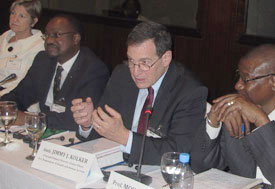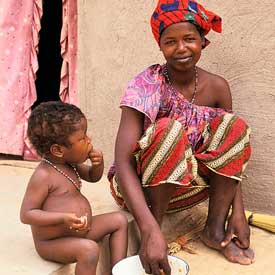US agencies integrating science into development, hold pilot meeting in Mali
March / April 2012 | Volume 11, Issue 2

Photo courtesy of USAID
U.S. Ambassador Jimmy Kolker urged American
health researchers and aid workers in Mali to
better coordinate their efforts and engage Malian
scientists to study approaches to improve health
in the country.
One of the central goals of the Obama administration's Global Health Initiative is to encourage greater collaboration among federal agencies to increase efficiencies and maximize impact. To better coordinate U.S. efforts in the field and accelerate progress, Fogarty and USAID are planning a series of networking meetings in developing countries where multiple U.S. agencies are engaged in health-related initiatives.
A pilot "science for development" meeting was held in Bamako, Mali, in late January, which brought together more than 100 U.S. and Malian scientists, government officials and development experts for a week-long session. Their goal was to identify ways research can be better incorporated into development activities to improve their effectiveness. The session is intended to serve as a model, with similar gatherings being planned by U.S. missions in Ghana, Ethiopia and Indonesia.

Photo by Curt Carnemark/World Bank
U.S. agencies recently held a "science for
development" meeting in Mali to identify ways
research can be incorporated into development
efforts.
U.S. Ambassador Jimmy Kolker told the group the global financial crisis and constrained budgets require evidence-based programs that produce measureable results. "There may not be more money for health so we require more health for the money," said Kolker, who is Deputy Director of the HHS Office of Global Affairs. In addition, he recommended GHI programs collect baseline data, keep good records and use data to improve implementation.
The GHI is based on a comprehensive, whole-of-government approach to global health and is intended to facilitate the integration, synergy and strategic alignment of U.S. research and technical guidance to help achieve country-specific health goals. In Mali, U.S. agencies are conducting an inventory of the nation's health research to better understand its breadth and depth, locate any knowledge gaps and find ways to address those gaps within existing portfolios. Also, they are identifying best practices and investigating how they can be scaled-up.
Meeting participants included Mali's health minister and other government officials, Malian scientists from academia and NGOs, as well as U.S. researchers and administrators from USAID, NIH, CDC, Department of Defense and the Peace Corps. The conference included presentations, discussions, group work and site visits to U.S.-supported projects. NIH has significant research and research training activities involving malaria, HIV/AIDS and TB, all in collaboration with the University of Bamako.
While the coup in Mali has slowed progress temporarily, the U.S. Mission is producing a follow-up action plan to better incorporate existing in-country research expertise into the development activities to improve progress. Some GHI funding is distributed by individual country offices so it can be directed to the highest priority needs locally.
A portion of these funds may be available for operations research conducted by in-country scientists. In addition, USAID's recently announced Partnerships for Enhanced Engagement in Research (PEER) program may provide additional opportunities for implementation science studies. PEER is intended to capitalize on competitively-awarded investments to support and build scientific and technical capacity in the developing world.
The Mali meeting was hosted and organized by USAID with input from NIH. To more broadly forge connections between the research and development agencies, Dr. Kathleen Handley is on detail from USAID to Fogarty to link U.S. funded scientists with development officials working on the ground. She's working closely with Fogarty's Division of International Relations, led by Dr. James Herrington.
More Information
To view Adobe PDF files,
download current, free accessible plug-ins from Adobe's website.